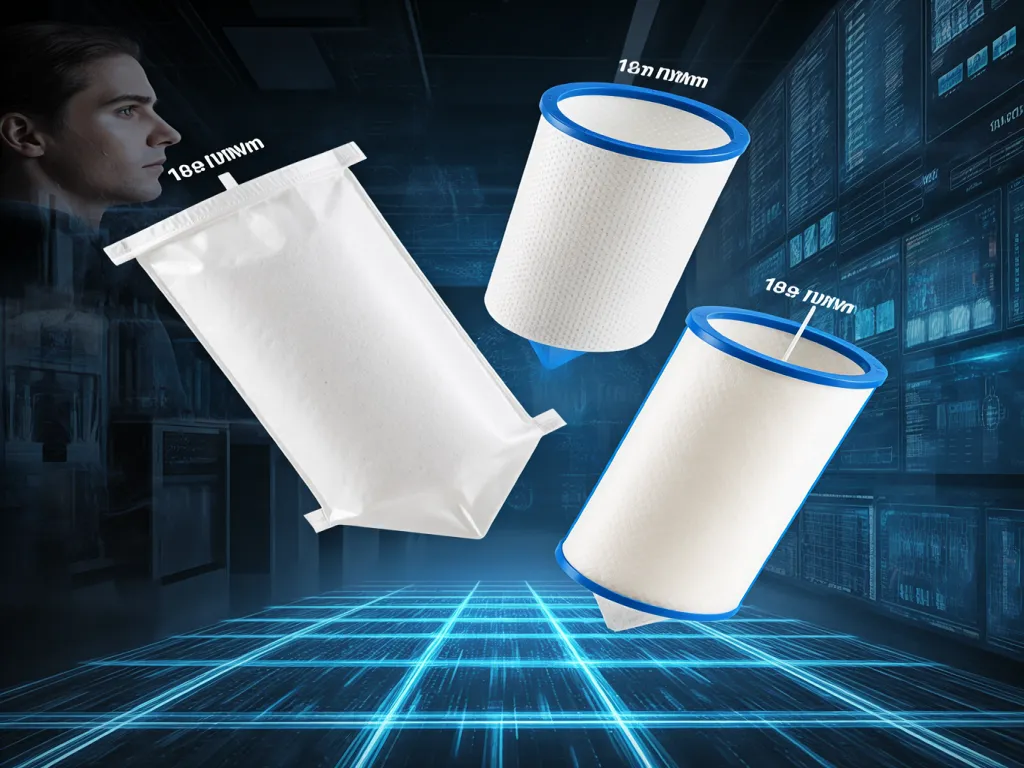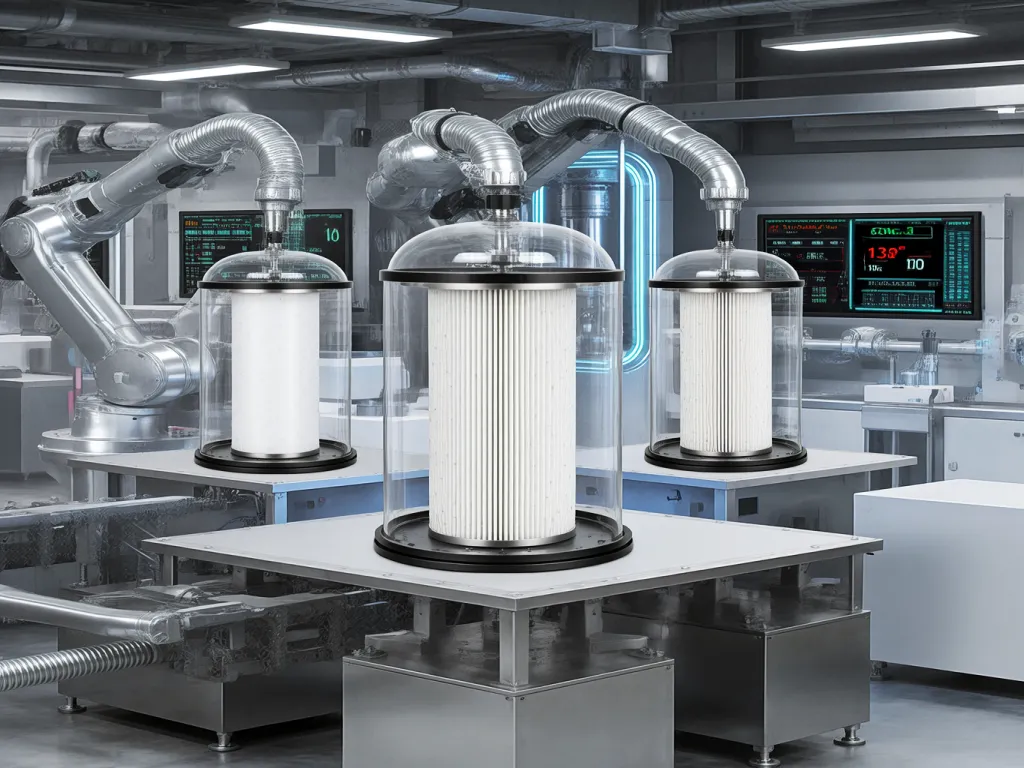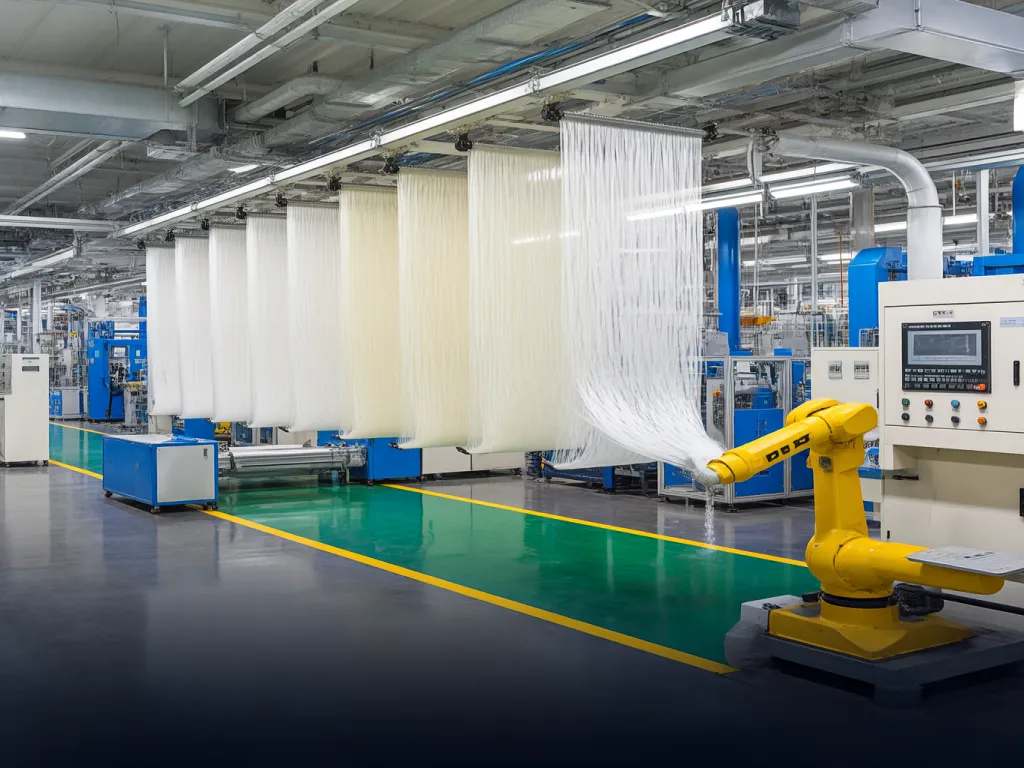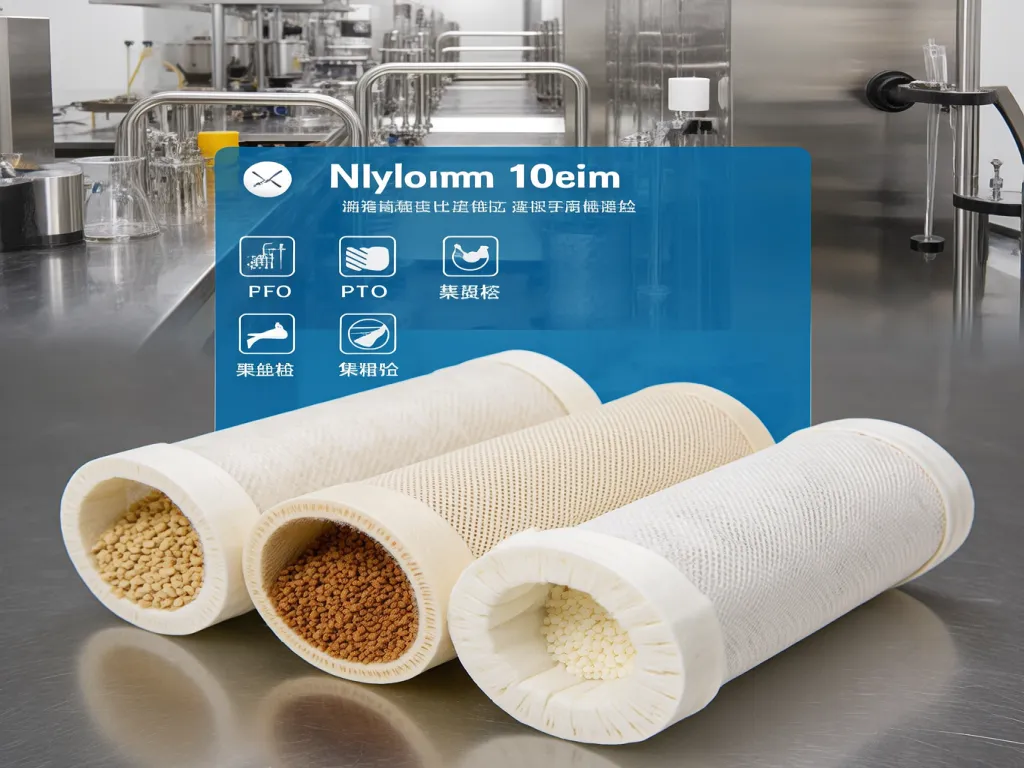100 Micron Filter Bag: Material Showdown

When it comes to industrial filtration, precision is key. The 100 micron filter bag stands as a cornerstone in separating fine particles from liquids or gases. But have you ever wondered how the choice of material affects its performance? In this blog, we’ll dive deep into the materials used in 100 micron filter bags, comparing their properties and filtering capabilities. Ready to unlock the secrets to optimal filtration? Let’s get started!

Polyester Filter Bags: Analyzing Temperature Resistance, Chemical Stability, and Filtration Efficiency Across Industrial Environments
When it comes to industrial filtration, choosing the right material for your 100 micron filter bag is more than just a technical decision—it’s a strategic move that can significantly impact performance, cost, and longevity. Among the array of materials available, polyester stands out as a popular choice, but why? Let’s dive deep into the characteristics of polyester filter bags, exploring their temperature resistance, chemical stability, and filtration efficiency, and how these traits make them suitable—or not—for various industrial settings. For those interested in exploring specific polyester filter bag options, consider our wholesale polyester dust collector filter bags for a comprehensive solution tailored to your needs.
First off, polyester’s temperature resistance is a game-changer. Imagine you’re operating in an environment where temperatures soar or plunge dramatically. Polyester filter bags can withstand continuous operating temperatures up to 130°C (266°F), with short bursts of exposure up to 150°C (302°F). This means whether you’re dealing with hot gases from a boiler or cold air in a refrigeration system, polyester maintains its structural integrity, ensuring consistent filtration performance without degrading or melting. Isn’t that reassuring?
Now, let’s talk about chemical stability. Industries often involve exposure to a variety of chemicals, some of which can be corrosive or reactive. Polyester filter bags excel here too. They exhibit excellent resistance to most acids, alkalis, and organic solvents, making them ideal for applications in chemical processing, pharmaceuticals, and even food and beverage production. Have you ever considered how a simple material choice could prevent costly downtime due to filter bag failure? Polyester’s chemical inertness ensures that it won’t react with the substances it filters, maintaining the purity of your products and the efficiency of your processes.
But what about filtration efficiency? After all, that’s the core function of any filter bag. Polyester fibers are engineered to provide a high surface area for particle capture, ensuring that even at 100 microns, fine particles are effectively trapped. The uniformity of polyester fibers also means less pressure drop across the filter, which translates to lower energy consumption and longer filter life. Ever wondered how to balance filtration efficiency with operational cost? Polyester filter bags offer a compelling solution, combining high capture rates with durability and ease of cleaning or replacement.
Temperature Resistance in Detail
The ability of polyester filter bags to handle extreme temperatures without compromising performance is rooted in their molecular structure. Polyester, a synthetic polymer, has a high melting point and excellent thermal stability. This means that even under prolonged exposure to high temperatures, the material doesn’t undergo significant chemical changes that could weaken its fibers or alter its filtration properties. For industries like metal smelting or glass manufacturing, where temperatures can reach extreme levels, polyester filter bags provide a reliable filtration solution that won’t fail when the heat is on. Conversely, in cold storage or cryogenic applications, polyester maintains its flexibility and strength, preventing brittleness and potential rupture. It’s this versatility that makes polyester a go-to material for a wide range of temperature-sensitive environments.
Chemical Stability Unpacked
Chemical stability is crucial in industries where the filtration process involves contact with aggressive chemicals. Polyester’s resistance to a broad spectrum of chemicals stems from its saturated carbon backbone, which lacks reactive sites for most chemicals to attack. This makes polyester filter bags resistant to hydrolysis, oxidation, and microbial degradation, ensuring they remain effective even in harsh chemical environments. For instance, in the production of acids or alkalis, polyester filter bags can filter out impurities without being degraded by the very substances they’re meant to purify. Similarly, in the food and beverage industry, where hygiene and purity are paramount, polyester’s non-reactive nature ensures that no unwanted chemicals leach into the product, maintaining safety and quality standards.
Filtration Efficiency Explored
Achieving high filtration efficiency at 100 microns requires a material that can trap particles effectively while allowing for optimal airflow. Polyester’s fiber structure, with its fine diameter and high surface area, creates a dense yet permeable matrix that captures particles efficiently. The uniformity of the fibers ensures consistent pore size distribution, minimizing the risk of bypass and ensuring thorough filtration. Moreover, polyester’s low moisture absorption reduces the likelihood of clogging, maintaining a steady flow rate and reducing the frequency of filter bag replacement. For industries where downtime is costly, such as automotive manufacturing or electronics assembly, polyester filter bags offer a cost-effective solution that maximizes uptime and productivity. For those seeking enhanced filtration performance, our high-efficiency polyester dust collector filter bags provide an even more robust solution.

Polypropylene Filter Bags: Analyzing Lightweight, Corrosion-Resistant Properties, and Cost-Effective Precision Filtration
When it comes to industrial filtration, choosing the right material for your 100 micron filter bag can make a world of difference. Polypropylene (PP) has emerged as a go-to option for many industries, thanks to its unique blend of lightweight construction, exceptional corrosion resistance, and cost-effectiveness. But how exactly does polypropylene stack up against other materials, and why should you consider it for your filtration needs? Let’s dive in and explore the benefits of polypropylene filter bags in detail.
First off, let’s talk about polypropylene’s lightweight nature. Unlike heavier materials like polyester or PTFE, polypropylene is incredibly light, making it easier to handle and install. This lightweight property also translates to lower shipping costs and reduced energy consumption during operation. Imagine being able to cut down on your operational expenses simply by choosing a lighter filter bag—that’s the kind of advantage polypropylene brings to the table.
But lightweight doesn’t mean flimsy. Polypropylene is surprisingly durable, especially when it comes to resisting corrosion. Chemicals, acids, and bases that would eat through other materials have little to no effect on polypropylene. This makes it an ideal choice for industries dealing with harsh chemicals, such as pharmaceuticals, food processing, and wastewater treatment. For specialized applications like cement dust collection, you might also explore cement dust bag filters that utilize similar durable materials. You can rest assured that your filter bag will maintain its integrity and performance, even in the most challenging environments.
Now, you might be wondering: does all this come at the cost of filtration precision? Absolutely not. Polypropylene filter bags are designed to provide consistent and reliable filtration at the 100 micron level. The material’s uniform pore structure ensures that particles of the desired size are captured, while allowing for optimal flow rates. This balance between precision and efficiency is what sets polypropylene apart from other materials.
But how does polypropylene manage to be both cost-effective and high-performing? The answer lies in its manufacturing process. Polypropylene is relatively inexpensive to produce compared to other materials like PTFE or nylon. This cost savings is then passed on to you, the end-user, making polypropylene filter bags a budget-friendly option without compromising on quality. Plus, with its long lifespan and resistance to wear and tear, you’ll be saving money in the long run by reducing the frequency of replacements.
Let’s not forget about the environmental aspect. Polypropylene is recyclable, which means you can dispose of your used filter bags responsibly. By choosing polypropylene, you’re not only making a smart business decision but also contributing to a more sustainable future.
So, how do you know if polypropylene is the right choice for your specific application? It all comes down to understanding your filtration needs. If you’re dealing with corrosive substances, require a lightweight solution, and want to keep costs down without sacrificing performance, then polypropylene is definitely worth considering. And with a wide range of sizes and configurations available, you can easily find a 100 micron polypropylene filter bag that fits your system perfectly.
In conclusion, polypropylene filter bags offer a winning combination of lightweight construction, corrosion resistance, cost-effectiveness, and reliable filtration precision. Whether you’re in the pharmaceutical, food processing, or wastewater treatment industry, polypropylene has something to offer. So why not give it a try and see the difference for yourself? Your bottom line—and the environment—will thank you.
Lightweight Yet Durable: The Polypropylene Advantage
One of the most striking features of polypropylene filter bags is their lightweight nature. Unlike heavier materials, polypropylene is easy to handle and install, reducing labor costs and making the filtration process more efficient. But don’t let its light weight fool you—polypropylene is surprisingly durable, especially when it comes to resisting corrosion. This makes it an excellent choice for industries dealing with harsh chemicals, ensuring that your filter bag will last longer and perform better.
Cost-Effective Precision: Balancing Quality and Budget
When it comes to filtration, precision is key. But achieving that precision doesn’t have to come at a high cost. Polypropylene filter bags offer a cost-effective solution without compromising on quality. Their uniform pore structure ensures consistent filtration at the 100 micron level, while their relatively inexpensive manufacturing process keeps costs down. For applications requiring high-temperature resistance, consider fiberglass filter bags as an alternative, though polypropylene remains an attractive option for businesses looking to maximize their filtration efficiency while staying within budget.
Environmental Considerations: A Sustainable Choice
In today’s world, sustainability is more important than ever. Polypropylene filter bags are recyclable, which means you can dispose of them responsibly and reduce your environmental footprint. By choosing polypropylene, you’re not only making a smart business decision but also contributing to a more sustainable future. It’s a win-win situation for both your bottom line and the planet.

Other Materials Comparison: Nylon, PTFE, and Their Performance in 100 Micron Filter Bags
When it comes to 100 micron filter bags, the choice of material isn’t just about achieving the desired filtration accuracy; it’s also about balancing performance, durability, and cost-effectiveness. While polyester and polypropylene are popular choices, other materials like nylon and PTFE (Polytetrafluoroethylene) offer unique advantages and disadvantages that can significantly impact your filtration process. Let’s dive into the specifics of these materials and see how they stack up against polyester and polypropylene in 100 micron filter bag applications.
Nylon: Strength and Durability in Filtration
Nylon’s strength and durability make it a top contender for 100 micron filter bags in demanding industrial environments. Its abrasion resistance ensures longevity even when filtering rough particles, while its moderate temperature resistance suits a wide range of applications. For applications requiring custom sizes or specialized designs, consider exploring our wholesale polyester filter bag supplier (although polyester is mentioned here for context on customization, nylon bags can also be custom-sized similarly) for inspiration on how tailored solutions can enhance performance. Though pricier than polyester, nylon’s superior tear and puncture resistance justify the investment in heavy-duty filtration tasks.
PTFE: Chemical and Temperature Resistance Unmatched
PTFE stands out for its unparalleled chemical inertness and high-temperature tolerance, making it ideal for corrosive or high-heat filtration processes. While costly, PTFE’s performance in extreme conditions justifies its use in specialized applications where other materials would fail. Its lower tear resistance compared to nylon means it’s not the best choice for abrasive environments, but its chemical stability is unmatched. For those seeking high-performance filtration solutions in extreme conditions, PTFE filter bags are a premium choice, though for cost-effective alternatives in less demanding scenarios, exploring options like polyester dust collector filter bags can provide valuable insights.
Making the Right Choice: Balancing Performance and Cost
Selecting the right material for your 100 micron filter bag involves weighing performance against cost. Nylon offers strength and durability for abrasive applications, while PTFE excels in corrosive or high-temperature scenarios. Polyester and polypropylene remain cost-effective options for less demanding uses, such as those found in polyester dust collector applications. Consider your specific needs, consult experts, and review material specifications to make an informed decision that maximizes filtration efficiency and longevity.
Choosing the right material for your 100 micron filter bag is pivotal in achieving top-notch filtration results. Whether it’s the durability of polyester, the cost-effectiveness of polypropylene, or the specialized properties of nylon and PTFE, each material brings its own set of advantages. By understanding these differences, you can tailor your selection to match your specific industrial needs. Don’t settle for less – contact us today for expert advice on material selection and elevate your filtration game. What material will you choose for your next 100 micron filter bag?

